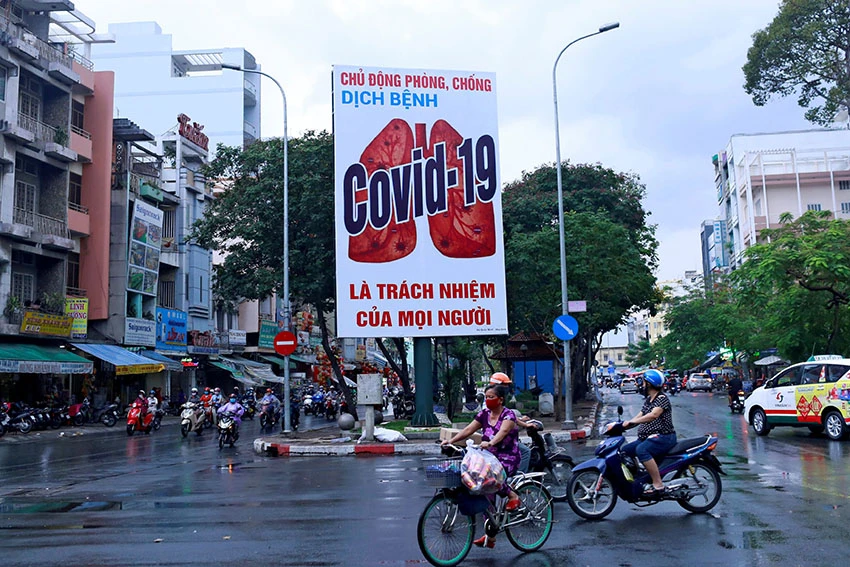
First, it looked like Vietnam was having a good U.S.-China trade war, quietly grabbing much of the factory business fleeing the mainland's shaky economy. Now it seems to be escaping the worst of the coronavirus pandemic, officially avoiding any deaths. But will its leaders take this chance to remake its uniquely trade-reliant economy? Or is it going to waste all the capital it has now acquired?
In the trade war, Vietnam has been at least as lucky as smart. Yes, its market-opening and deregulation efforts deserve credit for winning factory jobs at China's expense. But physical and ideological proximity to Asia's biggest economy, a fellow Communist government, helped too. Vietnam's reputation as a mini-China came in handy as Nike, Samsung and other multinationals set production priorities.
When it comes to COVID-19, officials in Hanoi are winning global praise for containing cases and reopening for business at lightning speed. Vietnam has had shoutouts from the World Health Organization and U.S. Centers for Disease Control and Protection. Its success is in stark contrast to outbreaks in Indonesia and Singapore, which is battling a second wave of infections.
The speed with which Hanoi claims to have flattened the infection curve exudes skill and nimbleness. You can quibble with its aggressive methods including strict quarantining, business closures and travel restrictions. But zero official deaths in a nation of 96 million is quite a feat. Neighboring Philippines, population 105 million, reports more than 630 fatalities.
Skepticism is warranted, given the slow pace of testing. Officially, Hanoi admits to 270 coronavirus cases. Even so, Vietnam is more in the orbit of Asian success stories, like South Korea and Taiwan, a universe away from America's 1 million-plus patients.
 Hanoi conducts a rapid test at Long Bien market to detect the potential spread of the novel coronavirus on Apr. 18: officials are winning global praise for containing cases. © Getty Images
Hanoi conducts a rapid test at Long Bien market to detect the potential spread of the novel coronavirus on Apr. 18: officials are winning global praise for containing cases. © Getty Images The soft power and political capital Vietnam is gaining would be a terrible thing to waste in the post-COVID-19 era. How governments perform in a global crisis often defines them in the views of investors, corporate chieftains and their population.
Hanoi has room to support growth internally. The State Bank of Vietnam could indeed cut the benchmark interest rate, as it did in March from 6% to 5%. There is fiscal space to finance big, job-generating infrastructure projects. At the end of 2019, Hanoi's debt-to-GDP ratio was 38%; Fitch Ratings sees it rising to 42.5% this year.
But this is no time to pop the champagne corks. The shock waves upending global growth are hitting Vietnam, and fast. The International Monetary Fund expects the economy to grow 2.7% this year, less than half the 7% rate in 2018 and 2019. Gross domestic product could easily go negative as demand from the U.S., China, Japan and Europe flattens. Tourism, which generates 10% of GDP, has ground to a halt.
But the thing which would pack the most punch for export-driven Vietnam, a global revival, seems remote as the globe's top-10 economies stumble and, most likely, turn more protectionist over the next 12 months. U.S. President Donald Trump, for example, is mulling retaliatory actions against Beijing for its handling of the pandemic. Trump even appears to be considering defaulting on U.S. debt held by Beijing.
The market turmoil that a trade war 2.0 generates would put Vietnam in harm's way. Hanoi is not without buffers, including a record $84 billion of foreign-exchange reserves. But Vietnam would pay the price for not acting faster to tackle corruption, strengthen the banking sector and diversify the economy away from exports. Hanoi must invest more in education and training to boost productivity. It also must shrink the state sector to make room for startup companies.
The risk is that COVID-19 fallout reduces Hanoi's tolerance for major upgrades to increase the role of the private sector and build a bigger domestic service sector. An April survey by the Vietnam Chamber of Commerce and Industry found that 60% of companies were already suffering from a lack of capital and reduced cash flow. At least 35,000 companies went bust in the first three months of 2020. For the first time in decades, notes the Asian Development Bank, the number of companies closing shop is topping new ones.
Just when strains are increasing, Prime Minister Nguyen Xuan Phuc is contending with a power struggle. There is growing uncertainty over who will occupy Vietnam's four most powerful posts from 2021 to 2026. With the leadership race in full swing, and a second wave of COVID-19 cases always a risk, it is easy to see how economic retooling could lose momentum.
Geopolitical jockeying could get in the way, too. Hanoi and Beijing have been at loggerheads over territorial claims in the South China Sea, and the risk that Trump will disrupt Asian supply chains anew is growing ahead of the U.S. election in November.
In a darkening world, Vietnam again looks like a clear standout. Yet maintaining that shine requires Hanoi to apply the same skill and nimbleness to the economy's health as it has to the coronavirus. That is easier said than done.




















